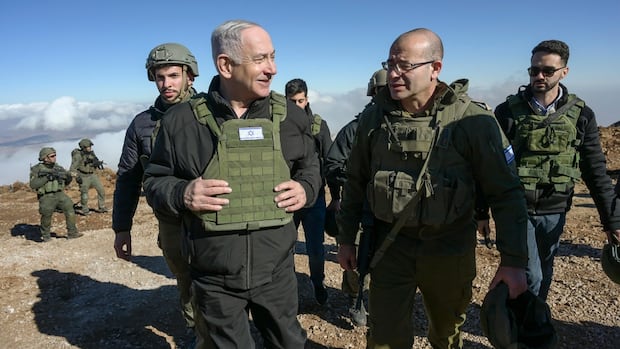
The Israeli military will remain inside Syrian territory — in what is supposed to be a demilitarized zone — indefinitely, Prime Minister Benjamin Netanyahu said Tuesday, as part of what he described as an effort to shore up security amid the turmoil in Syria.
The troops will remain “until another arrangement is found that will ensure Israel’s security,” Netanyahu said atop Mount Hermon, which is divided between the Israeli-occupied Golan Heights, Lebanon and Syria.
Israel entered the demilitarized buffer zone, to the east of the Golan Heights, earlier this month following the collapse of the Bashar al-Assad regime. Its capture of about 400 square kilometres of Syrian territory sparked accusations Israel was violating the 1974 UN-brokered ceasefire that established the zone, and that it was exploiting the chaos in its northeastern neighbour for a land grab.
Israel captured, and later annexed, the Golan Heights from Syria in the 1967 Arab-Israeli war. Its claim on the region is only recognized by the U.S.
Israeli Defence Minister Israel Katz, appearing with Netanyahu, said he instructed the military to quickly establish a presence including fortifications, in anticipation of what could be an extended stay in the area.
The mountain’s summit, the highest point in the area, will be “the eyes of the state of Israel to identify our enemies who are nearby and far away,” Katz said.

An Israeli military official, who spoke to The Associated Press on condition of anonymity in line with military regulations, said there is no plan to evacuate the Syrians living there from the zone.
This isn’t the first time Israel has entered the buffer zone this year.
An AP report last month examining satellite imagery found that Israel had been working on a construction project, possibly a new road, close to Syria from as early as July, and had in some cases entered the zone during construction.
UN forces later warned that the Israeli military has committed “severe violations” of its ceasefire deal with Syria.
Airstrikes across Syria
Israeli troops began moving into the buffer zone on Dec. 7, according to Israeli Foreign Minister Gideon Saar; the same day unidentified armed men attacked UN forces in Syria.
“[The Israeli military] took targeted and temporary control of certain areas near the border to prevent an Oct. 7 scenario from Syria,” Saar said at the time, referring to Hamas’s surprise 2023 attack into Israel from the Gaza Strip.
That was followed by a wave of airstrikes inside Syria which hit more than 350 targets including anti-aircraft batteries, military airfields, weapons production sites, combat aircraft and missiles, the Israeli military said.
Israeli missiles also struck Syrian ports where 15 naval vessels were docked.
Israeli officials said the strikes across Syria were aimed at destroying strategic weapons and military infrastructure to prevent them being used by rebel groups that drove al-Assad from power, some of which grew from movements linked to al-Qaeda and Islamic State.
Netanyahu earlier described entering the buffer zone as a necessary and “temporary defensive position.”
Regional condemnation
A UN spokesman said Tuesday that the advance of Israeli troops, however long it lasts, violates the deal that set up the buffer zone.
That agreement “needs to be respected, and occupation is occupation, whether it lasts a week, a month or a year, it remains occupation,” said Stephane Dujarric .
There was no immediate comment from Hayat Tahrir al-Sham (HTS), the insurgent group that led the ouster of al-Assad, or from Arab states.
Previously, Ahmad al-Sharaa — Syria’s de facto leader and the head of the HTS — said Israel is using false pretexts to justify its attacks, but he made it clear he’s not interested in engaging in new conflicts as the country focuses on rebuilding.
Others in the region condemned Israel’s move into Syrian territory earlier this month. The Egyptian Foreign Ministry accused Israel of “exploiting the power vacuum… to occupy more Syrian territories and create a fait accompli in violation of international law.”
Saudi Arabia separately criticized Israel for its “determination to undermine opportunities for Syria to restore its security, stability and territorial integrity.”
https://i.cbc.ca/1.7413069.1734480562!/cpImage/httpImage/image.jpg_gen/derivatives/16x9_1180/israel-syria.jpg?im=Resize%3D620
2024-12-17 18:15:17